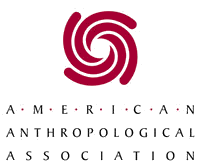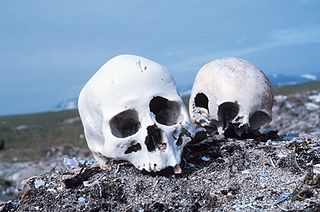Related Research Articles

Anthropology is the scientific study of humanity, concerned with human behavior, human biology, cultures, societies, and linguistics, in both the present and past, including past human species. Social anthropology studies patterns of behavior, while cultural anthropology studies cultural meaning, including norms and values. A portmanteau term sociocultural anthropology is commonly used today. Linguistic anthropology studies how language influences social life. Biological or physical anthropology studies the biological development of humans.
Australo-Melanesians is an outdated historical grouping of various people indigenous to Melanesia and Australia. Controversially, groups from Southeast Asia and South Asia were also sometimes included.

The American Anthropological Association (AAA) is an organization of scholars and practitioners in the field of anthropology. With 10,000 members, the association, based in Arlington, Virginia, includes archaeologists, cultural anthropologists, biological anthropologists, linguistic anthropologists, linguists, medical anthropologists and applied anthropologists in universities and colleges, research institutions, government agencies, museums, corporations and non-profits throughout the world. The AAA publishes more than 20 peer-reviewed scholarly journals, available in print and online through AnthroSource. The AAA was founded in 1902.
An anthropologist is a person engaged in the practice of anthropology. Anthropology is the study of aspects of humans within past and present societies. Social anthropology, cultural anthropology and philosophical anthropology study the norms and values of societies. Linguistic anthropology studies how language affects social life, while economic anthropology studies human economic behavior. Biological (physical), forensic and medical anthropology study the biological development of humans, the application of biological anthropology in a legal setting and the study of diseases and their impacts on humans over time, respectively.

Forensic anthropology is the application of the anatomical science of anthropology and its various subfields, including forensic archaeology and forensic taphonomy, in a legal setting. A forensic anthropologist can assist in the identification of deceased individuals whose remains are decomposed, burned, mutilated or otherwise unrecognizable, as might happen in a plane crash. Forensic anthropologists are also instrumental in the investigation and documentation of genocide and mass graves. Along with forensic pathologists, forensic dentists, and homicide investigators, forensic anthropologists commonly testify in court as expert witnesses. Using physical markers present on a skeleton, a forensic anthropologist can potentially determine a person's age, sex, stature, and race. In addition to identifying physical characteristics of the individual, forensic anthropologists can use skeletal abnormalities to potentially determine cause of death, past trauma such as broken bones or medical procedures, as well as diseases such as bone cancer.
The Caucasian race is an obsolete racial classification of humans based on a now-disproven theory of biological race. The Caucasian race was historically regarded as a biological taxon which, depending on which of the historical race classifications was being used, usually included ancient and modern populations from all or parts of Europe, Western Asia, Central Asia, South Asia, North Africa, and the Horn of Africa.
Applied anthropology is the application of the methods and theory of anthropology to the analysis and solution of practical problems. In Applied Anthropology: Domains of Application, Kedia and Van Willigen define the process as a "complex of related, research-based, instrumental methods which produce change or stability in specific cultural systems through the provision of data, initiation of direct action, and/or the formulation of policy". More simply, applied anthropology is the praxis-based side of anthropological research; it includes researcher involvement and activism within the participating community. John Van Willengen simply defined anthropology as " anthropology put to use". However, the concept of applied anthropology was put forward by Daniel G. Brinton.
History of anthropology in this article refers primarily to the 18th- and 19th-century precursors of modern anthropology. The term anthropology itself, innovated as a New Latin scientific word during the Renaissance, has always meant "the study of man". The topics to be included and the terminology have varied historically. At present they are more elaborate than they were during the development of anthropology. For a presentation of modern social and cultural anthropology as they have developed in Britain, France, and North America since approximately 1900, see the relevant sections under Anthropology.

Anthropology of media is an area of study within social or cultural anthropology that emphasizes ethnographic studies as a means of understanding producers, audiences, and other cultural and social aspects of mass media.
American Anthropologist is the flagship journal of the American Anthropological Association (AAA), published quarterly by Wiley. The "New Series" began in 1899 under an editorial board that included Franz Boas, Daniel G. Brinton, and John Wesley Powell. The current editor-in-chief is Elizabeth Chin.
Tom Boellstorff is an anthropologist based at the University of California, Irvine. In his career to date, his interests have included the anthropology of sexuality, the anthropology of globalization, digital anthropology, Southeast Asian studies, the anthropology of HIV/AIDS, and linguistic anthropology.
The following outline is provided as an overview of and topical guide to anthropology:
Urban anthropology is a subset of anthropology concerned with issues of urbanization, poverty, urban space, social relations, and neoliberalism. The field has become consolidated in the 1960s and 1970s.

Surajit Chandra Sinha was an Indian anthropologist.
Educational anthropology, or the anthropology of education, is a sub-field of anthropology and is widely associated with the pioneering work of Margaret Mead and later, George Spindler, Solon Kimball, and Dell Hymes, and Jean Lave. It gained attraction as a field of study during the 1970s, particularly due to professors at Teachers College, Columbia University. As the name would suggest, the focus of educational anthropology is on education, although an anthropological approach to education tends to focus on the cultural aspects of education, including informal as well as formal education.
Social anthropology is the study of patterns of behaviour in human societies and cultures. It is the dominant constituent of anthropology throughout the United Kingdom and much of Europe, where it is distinguished from cultural anthropology. In the United States, social anthropology is commonly subsumed within cultural anthropology or sociocultural anthropology.
Indian Anthropological Association (IAA) is the representative body of the professional anthropologists in India. Established in 1969, its headquarters are situated within the Department of Anthropology, University of Delhi and associated with World Council of Anthropological Associations (WCAA).
Tarak Chandra Das (1898–1964) was an anthropologist of Calcutta University. He did his Masters' from Calcutta University in ‘Ancient Indian History and Culture’ and joined the then newly founded Department of Anthropology at Calcutta University in 1921 as a research scholar and then he became lecturer in 1923 and finally retired as a Reader from the Department in 1963. Das conducted extensive fieldworks in Chotanagpur in the then Bihar and in Assam.
Gerald Duane Berreman (1930-2013) was an American anthropologist and ethnographer who was known for his theory on the caste system in India, as well as his contributions to the ethical practice of anthropology itself. Berreman spoke out during the Vietnam War era about the working relationship between anthropologists and the CIA. His anthropological work focused on the study of social stratification, in which he drew parallels between racial inequality in the United States and the caste system in India.
Lakshminarayanapuram Ananthakrishna Krishna Iyer was an Indian anthropologist and a writer of several books on the subject. He was the head of the department of Anthropology at the University of Madras and was credited with studies on the tribal and scheduled caste people of Kerala, a work initiated by his father, L. K. Ananthakrishna Iyer, himself a noted anthropologist. Anthropology in India, Social History of Kerala, a two-volume historical study and The Travancore Tribes and Castes, a three-volume account of the tribal people of southern Kerala are some of his notable works. The Government of India awarded him the third highest civilian honour of the Padma Bhushan, in 1972, for his contributions to science. His sons, L.K. Ananthakrishnan,L. K. Balaratnam, is also a known anthropologist. Dr L.K. Ramachandran noted Scientist/ Bio-Chemist/> L.K. Padmanabhan His daughters, L.K. Lakshmi, L.K. Kamalam, L.K. Bhagirathy and L.K. Parvathy. He is the great grandfather of Sailesh Kalyan.
References
- ↑ "The Anthropologist - About". KRE Journals. Retrieved 21 December 2013.
- ↑ Srivastava, Vinay Kumar; Chaudury, Sukant K. (2009). "Anthropological Studies of Indian Tribes". In Atal, Yogesh (ed.). Sociology and Social Anthropology in India. Pearson Education India. pp. 51, 53, 56. ISBN 9788131720349.